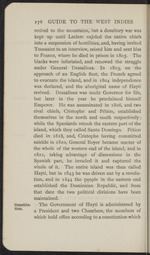| 1 |
 |
“...of the
Perdrix. It was the custom, in those troubled
days of warfare, for boats to row backwards and
forwards across the harbour during the hours of
night, the sailors of the different ships in the dock,
headed by one of their officers, taking it by turns
to keep this watch; and the sleeper might often
be roused from his dreams as the deep-toned
“ All’s well ” resounded through the still night
air. Lord Camelford and Lieutenant Peterson
were unhappily at variance; and, perhaps to
mortify his rival, Lord Camelford ordered Mr.
Peterson to take the watch upon the very evening
that a gay ball was to be given at Black’s Point
to the naval officers. Unfortunately Lieutenant
Peterson entertained the idea that, as he was in
command of the ship Perdrix, in the absence of
Commodore Fahie, he was superior officer to Lord
Camelford, who only commanded a sloop; and,
in consequence of this false impression, he posi-
1 Of which island he was a native....”
|
|
| 2 |
 |
“...hostilities, and, having invited
Toussaint to an interview, seized him and sent him
to France, where he died in prison in 1803. The
blacks were infuriated, and renewed the struggle
under General Dessalines. In 1803, on the
approach of an English fleet, the French agreed
to evacuate the island, and in 1804 independence
was declared, and the aboriginal name of Hayti
revived. Dessalines was made Governor for life,
but later in the year he proclaimed himself
Emperor. He was assassinated in 1806, and two
rival chiefs, Cristophe and Pétion, established
themselves in the north and south respectively;
while the Spaniards retook the eastern part of the
island, which they called Santo Domingo. Pétion
died in 1818, and, Cristophe having committed
suicide in 1820, General Boyer became master of
the whole of the western end of the island, and in
1822, taking advantage of dissensions in the
Spanish part, he invaded it and captured the
whole of it. The entire island was then called
Hayti, but in 1843 he was driven...”
|
|
